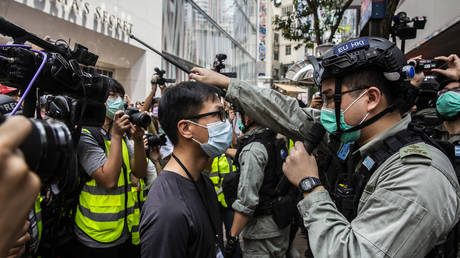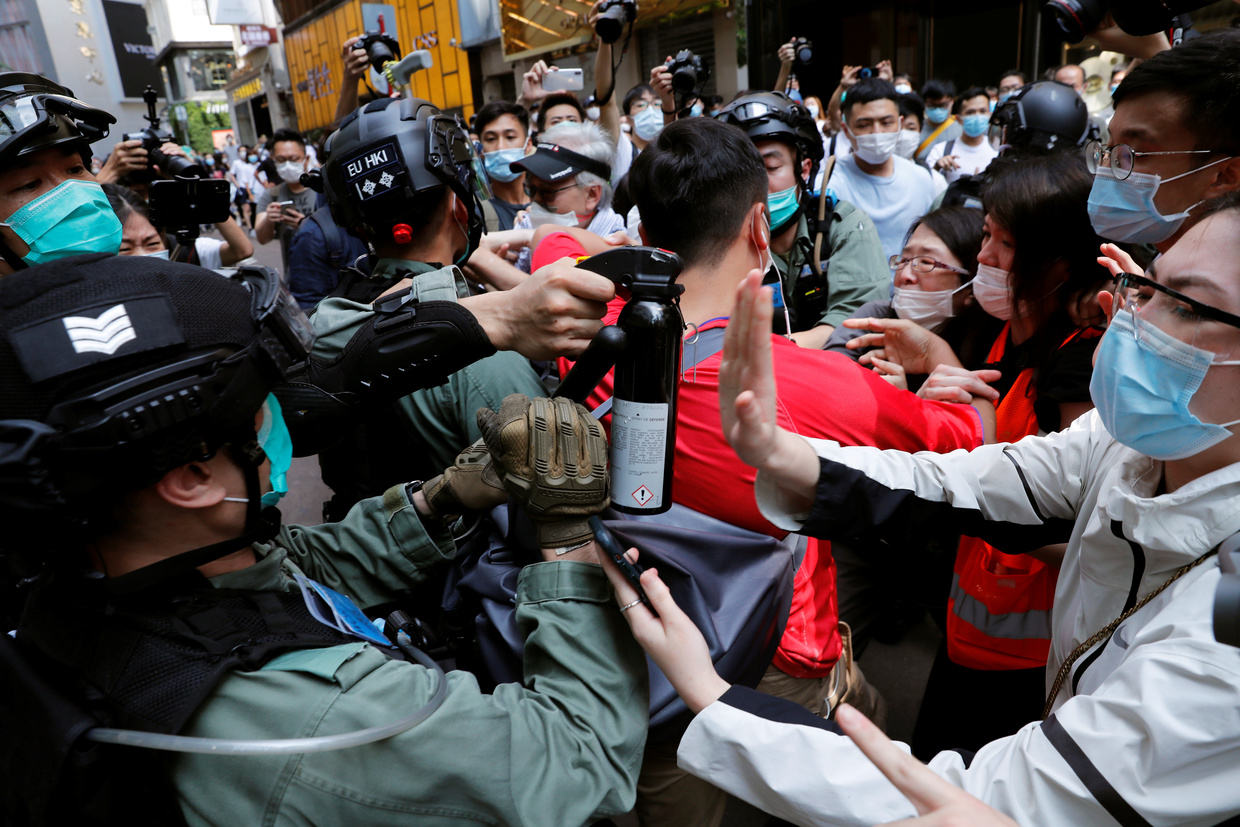
As violence yet again grips the streets of Hong Kong, a fresh clash between Chinese students and a writer for website Axios shows how Western pundits are back demanding the people take a stand for ‘pro-democracy’ protesters.
Hong Kong’s streets have once more become the scene of clashes between protesters and riot police as of last week. On Wednesday, officers used pepper pellets to disperse crowds at the city’s financial heart. The fresh wave of demonstrations was triggered by a national security law proposed by Beijing, which would ramp up security in the autonomous Chinese city.

Widely labeled as ‘pro-democracy’ in the Western media, the Hong Kong protest movement has plenty of supporting foreign voices. Ironically, some of these supporters don’t seem to put much faith in democratic procedures when they don’t favor their stance. A fresh example comes from Axios and its coverage of a Beijing-bashing draft resolution, which was defeated at a student college in England.
The motion put before students at the University of Warwick sought to condemn the “unprecedented levels of police brutality, infringement on democracy and human rights” in the Chinese city and to encourage pro-protester events on campus.
It was strongly opposed by students from mainland China, however, who apparently organized an unprecedentedly high voter turnout and defeated the proposal by 2,041 votes to 971.
This development seems to have angered a China author at Axios, who penned a critical story about what had happened. According to the article, the university’s Chinese students, who number around 3,200 of the 27,000-strong student body, did a disservice to “democratic values” at Warwick.
The story stops short of accusing the naysayers of being Beijing’s agents, only mentioning that “Chinese embassies and consulates maintain close relationship with Chinese student groups.” But the Twitter feed of the author, Bethany Allen-Ebrahimian, leaves little doubt as to who she blames for the resolution’s failure – the Chinese government.
The story led to a fierce debate between the author and a Chinese student, who had spoken against the proposal and was cited in the story. The student, Zishi Zhang, said the notion that he and others at Warwick somehow got democracy wrong with their vote showed “classic bias” against China.
“The question democratic societies are facing now is, what happens when people (right-wing populists, or whoever) use liberal democratic means to promote illiberalism?” Allen-Ebrahimian lashed out in response. “The values in question are not those of ‘democracy,’ but of ‘liberal democracy.’”
Her opponent said that, when champions of liberalism simply dismiss vote outcomes they dislike – be it the election of Donald Trump, or Brexit – as fruits of “illiberal democracy”, it seems disingenuous. The approach boils down to “vote again if I didn’t like the result you voted,” he noted. “This is rather patronizing and self-defeating.”
Hong Kong has suffered from months of protests, which have often escalated into vandalism and violence by the radical part of the movement. The protesters accuse the Chinese government of infringing on the city’s freedoms under the so-called ‘one country, two systems’ arrangement.
Some of them showed their attitude to Beijing by defacing the Chinese flag and other national symbols, acts that the security law floated by the government seeks to punish more harshly. The protesters also called on foreign powers, like Hong Kong’s former colonial master Britain, to support them diplomatically, and even with force.
Several Western governments have publicly voiced their support for the protests and blamed Beijing’s policies for causing the discontent. This pressure continues amid the new wave of demonstrations, with US President Donald Trump promising “very interesting” new measures against China coming “very powerfully” by the end of this week. Beijing has accused Western nations of inflaming the violence in Hong Kong.
Like this story? Share it with a friend!




